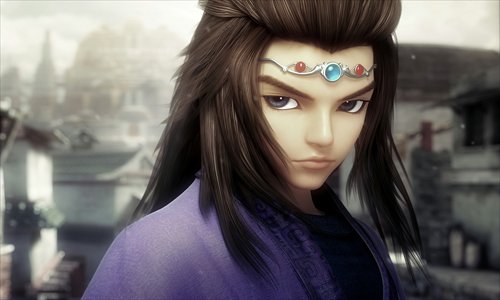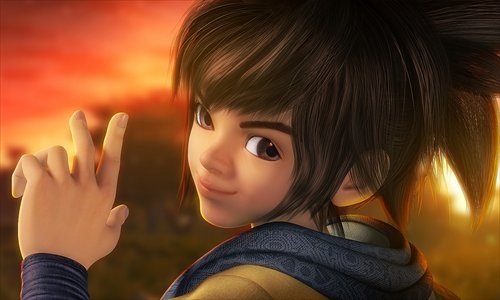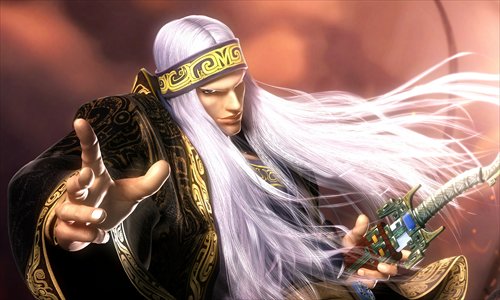The legend returns



Characters from The Legend of Qin: Xiang Shaoyu, Tianming and Wei Zhuang Photos: Courtesy of StarQ Animation Studio
The year 2014 will be big for The Legend of Qin, says Shen Leping, 2012 best animation director according to the then State Administration of Radio Film and Television.
After a silence of more than 10 months, The Legend of Qin animated series is coming back for its fans, bringing the new season to China's largest online video websites Youku and Tudou as well as a 3D feature movie to theaters.
The non-animated namesake TV series is also directed by Shen, and scheduled for release this year as well. A 3-D action role-playing game is also coming out this year.
All these stories are based on the popular swordsmen stories by Wen Shiren. "They present different aspects of storylines in the world of The Legend of Qin. With some magic-style skills and scenes, the animated series and the movie are closer to fantasy while the real-person TV series gets back to traditional Chinese martial arts and history," Shen told the Global Times.
In contrast to animations like Boonie Bears and Pleasant Goat and Big Big Wolf, The Legend of Qin targets older audiences aged 12 to 25, telling historical stories that also pack a cultural punch.
Being the most-watched animated series on CCTV in 2008, The Legend of Qin was voted favorite original animation for four consecutive years from 2007 to 2010 at the MVG Awards supported by 21cn.com. The Legend of Qin animated series has more than 3 million fans, Shen says.
Imperial education
The story surrounds 12-year-old Tianming, hunted by Emperor Qin Shihuang since the boy's father Jing Ke was killed after failing to assassinate the emperor. Protected by swordsman Ge Nie, Tianming escapes the emperor's soldiers and embarks on an adventure with his friends, witnessing the rise and fall of a great empire.
Beyond the boy's story, The Legend of Qin offers a complicated Web of relationships as a backdrop for that historical period, with diverse characters, kingdoms and schools that include Confucianism, Mohism, Taoism, Yin-yang and Names.
Schools of ancient Chinese philosophy are presented more like competing martial arts genres, generating fantastic visual effects and superhuman skills.
Classic life stories of the philosophers and arguments are thrown into the mix, such as the sophistry debates at the School of Names.
Shen tells the Global Times this saucy historical background is one of the reasons he wanted to construct a great story. "Some of the real men in history appear in this animation," he said. "And I'm so glad some teen fans of the series are looking for more knowledge behind the story. It makes me feel we are promoting culture."
The Qin Dynasty (221-206 BC) is a very special period of Chinese history. The first emperor conquered kingdoms and built a united empire for the first time in Chinese history, unifying the currency, language and thought in a very short period.
"He [Emperor Qin Shihuang] made a nice foundation for the prosperity of later dynasties such as the Han, but there were conflicts and discontent around the country, which led to a collapse of his empire after his death," Shen says. "We're actually telling a story of an empire through a little boy's eyes."
Online preference
The first season of the animated series started in 2007 with ten 22-minute episodes, focusing on the escape of Tianming and Ge Nie. As the storylines developed, more characters and schools were added and following seasons contained more and more content: 18 episodes for the second season, 34 in the third season and 37 in the fourth season.
The upcoming fifth season is probably even longer. Although the original plan was to tell the whole story in seven seasons, Shen and his team are considering how to contain so many storylines in one master plan and yet also tell a clear and coherent story.
"We didn't want to break the plan, but our fans have been waiting for the next season for so long," Shen says. "So we decided to update the fifth season on the websites weekly while we are still producing the rest of the story."
The online broadcasting copyright for the fourth season of the animation series reached 12 million yuan ($1.9 million), breaking the record for online animation video websites in 2012. With average clicks of about 5 million an episode and more than 400 million views in total, the show proved worth the price. The fifth and sixth seasons have already been presold to Youku and Tudou.
Though the series is also popular on TV, the producers prefer the online market.
"The online videos are available 24-7 and our fans don't worry about missing any of the updates," Shen says. "We can directly check statistics about popular plots: Some episodes have obviously been watched by fans more than once while other bits get skipped. And we can read comments from fans online."
Feedback will help thr creators frame the story better next season, he explains.
Overseas promotion
The animated series has been translated into seven languages and distributed in 37 regions and countries including the US, Canada, France, Italy and Spain.
"I was worried at first about whether overseas audiences could accept the complicated background of Chinese history and culture in this animation, but eventually I found that concern totally unwarranted," Shen says.
Just like Game of Thrones translates to Chinese audiences, foreign audiences also enjoy exploring the more perplexing cultural references.
"Actually, we got very good feedback from the overseas market, especially North America," Shen says.
The first two seasons have been shown on TV and online video websites in the US, achieving more than 1 million views.